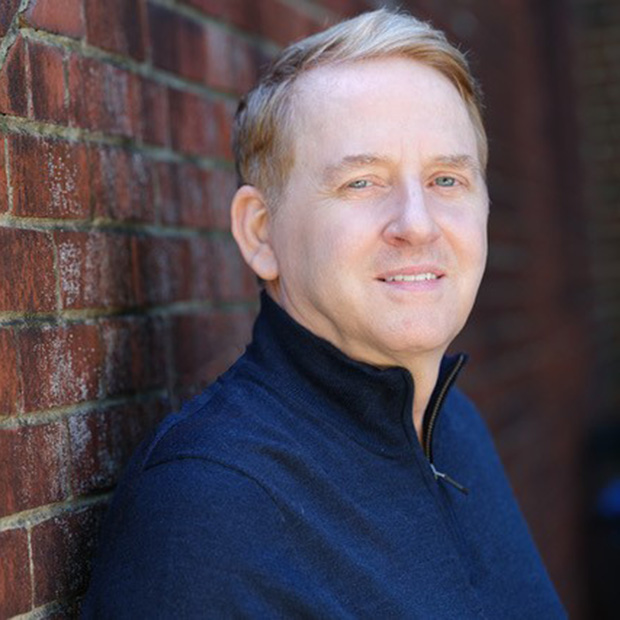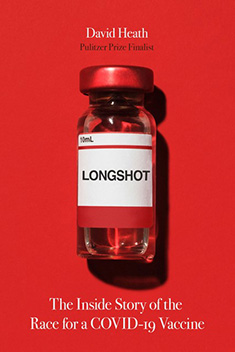On the vaccination trail with investigative reporter David Heath ’81
January 21, 2022 — When David Heath ’81 was asked by his USA Today editors in June 2020 to follow the development of Moderna’s COVID-19 vaccine, the veteran investigative journalist jumped on the story. Heath soon found, however, that drug company executives weren’t particularly interested in talking to him.
 David Heath ’81
David Heath ’81
Then Heath interviewed Barney Graham, deputy director of the Vaccine Research Center, at the National Institutes of Health. Graham’s work basically spearheaded the breakthrough that’s led to the current COVID-19 vaccines, and Heath decided that his story lay with the small group of scientists who’d spent years researching vaccine technology.
In January 2021, USA Today published Heath’s story, Luck, foresight and science: How an unheralded team developed a COVID-19 vaccine in record time. One of his editors said Heath had the basis for a book and put Heath in touch with her agent. Soon thereafter, Heath was offered a book deal.
“I’d always wanted to write a book but I wasn’t sure the topics I knew about were book-worthy,” says Heath. “But I thought this definitely was.”
The resulting book, Longshot: The Inside Story of the Race for a COVID-19 Vaccine was released earlier this month. It’s dedicated to the late Peter Connelly, the Grinnell English professor who inspired Heath to become a writer.
 Cover art for David Heath '81's
Cover art for David Heath '81's
just released book, Longshot
“When I got to Grinnell, I thought I might be a lawyer,” says the soft-spoken Heath, whose Oklahoma accent – he and his brother, Don Heath ’79, grew up in Enid, Oklahoma – still lingers. “The thing that made me decide to become a writer was my freshman tutorial on Symbolism and Literature with Peter Connelly. We read James Joyce and Joseph Conrad, and I loved it. He became a mentor. He’s very theatrical in his presentation, very lively and a very smart guy.”
Armed with an English degree and a desire to write, he turned to journalism after graduation. “I literally went into and applied at my local paper (in Enid) and was hired,” says Heath, who worked there five years. His investigative reporting career began at his next paper, The (Louisville) Courier-Journal in 1993, when the managing editor asked him to cover a failed, Lexington life insurance company. What seemed like a boring assignment, says Heath, turned into a major scandal that ended the political career of then-Gov. Wallace Wilkinson.
It was the beginning of what’s become an award-winning career, including being named a Pulitzer Prize finalist three times.
Heath, who’s married to an editor and is the father of a high school senior, has written a slew of stories that have made a difference. A series he wrote for PBS Frontline and The Center for Public Integrity focused on corporate dental chains that pressured dentists to hit revenue targets that led to unnecessary treatments. Another favorite story, written for The Center for Public Integrity and CBS News, was about loan shark/race car driver Scott Tucker, who created a massive, illegal online payday lending company. The multibillion dollar business defrauded 4.5 million Americans. Tucker was prosecuted and is now in prison, and the story was featured in Netflix’s Dirty Money series.
Heath’s biggest professional leap was going to the Seattle Times in 1999, which at the time had one of the nation’s best investigative reporting teams. “I worked on some really big stories there,” recalls Heath fondly. His biggest (co-written with Duff Wilson) was an exposé of doctors at the renowned Fred Hutchinson Cancer Research Center, who were running high-risk clinical trials without proper informed consent. The doctors had a financial stake in the trials’ outcome, and the results for patients were catastrophic. The story won nearly every major journalism award and was a Pulitzer finalist.
Another story involved hedge fund managers who were getting information on experimental drugs from scientists conducting drug trials. Based on that inside information, they’d short a drug company’s stock or buy it before everyone else. “It took a while but eventually the Justice Department prosecuted some 90 people, one of the biggest insider trading prosecutions in U.S. history,” Heath explains. “It’s hard not to feel like you’re doing something useful when things like that happen.”
So what does it take to be a great investigative journalist? Heath says two qualities are essential: a sense of outrage when someone powerful is taking advantage of someone less powerful and sometimes powerless; and a persistence to get to the truth of the matter, to go months without a byline in the newspaper to tell a bigger story.
“It’s like being a detective,” Heath says. “It’s really fun. It can be tedious for a lot of people to get a big stack of documents and find the nuggets but I eat it up. I love it. Writing the book was like that – getting to the bottom of things and finding out what really happened.”
— by Anne Stein ’84
For your information:
The Inside Story of the Race for a COVID-19 Vaccine debuted on Jan. 18 and is available at bookstores nationwide as well as online.
To read more alumni news, check out our news archive and like the Alumni & Friends Facebook page.